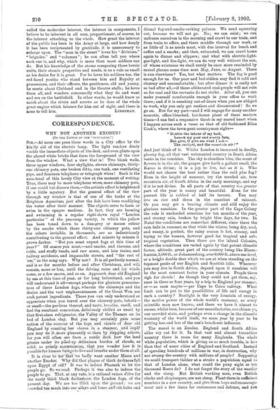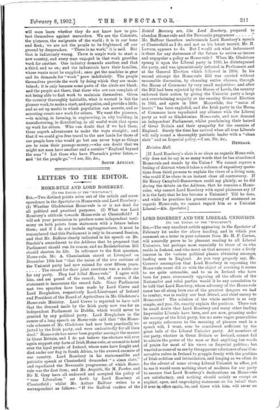CORRESPONDENCE.
WHY NOT ANOTHER EXODUS?
[TO THE EDITOR OF THE -srEc-rezos.”1 Silt,—At noon one pens these words in a City office by the kinily aid of the electric lamp. The light renders dimly visible the immediate objects of the desk, and even glints upon the glazed white bricks that form the foreground of the view from the window. What a view that is ! Two blank walls, three upper windows, four skylights, eleven chimneys, thirty- one chimney pots, one broken ditto, one tank, one ventilating pipe, and fourteen telephone or telegraph wires! Such is the sum-total of this lovely City view at the moment of writing. True, there may be more telephone wires, more chimney pots, if one could but discern them,—the artistic effect is heightened by a little mystery. But the general effect of the view through my window is that of one of the tanks at the Brighton Aquarium just after the fish have been muddying the water after their manner. The objects seem to loom or swim in the opaque medium. In fact, they are looming and swimming in a regular right-down royal "London particular" of the pea-soup variety, in which the yellow has been toned down to a dun-grey or mouse colour by the smoke which those thirty-one chimney pots, and the others invisible, in thousands, are so industriously contributing to the general effect. And minute by minute it grows darker. "But you must expect fogs at this time of year?" Of course you must, —and smoke, and rheum, and colds, and stuffy beads, and raw noses, and late trains, and railway accidents, and impassable streets, and "the rest of 'em," as the song says. Why not? It is all perfectly normal, and is so for months before and after Christmas, and will remain, more or less, until the driving rains and icy winds come, or a few snows, and so on. Approach clear old England by sea at this time of year, or for long beforehand, and you will understand it all—except perhaps the glorious gruesome- ness of these London fogs, wherein the chimneys and the drains and the vast unpleasantnesses of the Great Wen are such potent ingredients. Those you can only understand or appreciate when you travel over the chimney-pots, behold— or smell—the purlieus thereof, and taste, breathe, smell, and feel the resultant concoction, deliciously chilled as usual by that first-class refrigerator, the Valley of the Thames on its besi of London . clay. But you may certainly gain some notion of the contoutr of the fogs and clouds of dear old England by -coasting her shores in a steamer; ..and:hap. you, may do it-more vle.asantly so than by Stepping ashore, for you will :often .see, from a suniit deck how the land groans under its piled-pp .Atlintean burden of clouds, so solid, so grinity. mountainous, ,tbat. you wonder how it is possible for hiiman beings to live and breathe under them at all. It is clear fo iliethat we badly want another bloses and another Booting. Why did that plague of thiek'dnikiiess fall upon Egypt of old ? It was to induce Pharaoh to let the people go. So we read. Perhaps it was also to induce the people to go.' That, at any rate, in ritibtal raison d'etre for the nasty thick black darkndsseg; the LOndOn fogs, of the present day. We are too thick upon the ground ; we are crowded too much into our alleys and lanes and-itt7holes and dismal fog-and-smoke-reeking palaces. We need squeezing out, because we will not go. No ; we can exist; we can unfreeze ourselves in the morning and crawl to our train, and
from train to office, and there muddle through our work, or as little of it as needs must, with clue interval for lunch and coffee and a smoke; and then, exhausted, we can crawl home again to dinner and slippers; and what with electric-light, gas-light, and fire-light, we can do very well without the sun, of whose existence we shall surely be once more reminded by casual gleams some time next May, June, or August. There is sun elsewhere ? Yes, but what matters. The fog is good enough for us. Our poor and bed-ridden may find it cold and clammy and uncomfortable ; but after dinner it is really not so bad after all,—if those obliterated coal-people will not ruin us for coal and the servants da not strike. After all, you can make yourself comfortable enough in your office to work there; and if it is sunshiny out-of-doors when you are obliged to work, why you only get restless and discontented ! So we go on. But for my part—and I will engage for many another neurotic, office-bleached, hot-house plant of these modern times—I can feel a responsive throb in my seared heart when I happen across such a verse as that of old-fashioned Eliza Cook's, where the town-pent countryman sighs-
" Double the labour of my task, Lessen my poor and scanty fare, But give, 0 give me what I ask— The ,unliyht, and the mount 'lin air!"
And just think of it. Whilst London is immersed in deadly, gloomy fog, all that vast untenanted country in South Africa basks in the sunshine. The sky is cloudless blue, the scent of flowers is in the air, the grapes give forth a gallant smell, the Karoo is divine; it is a joy. to live, hot as it is. Who would not choose the heat rather than the cold plus fog? Even in the height of summer, try the rarefied air, true mountain air, of South Africa in the early mornings, and say if it be not divine. In all parts of that country tLe greater part of the year is sunny and beautiful. Even for the poorest life is robbed of half its terrors. You may live on rice and dress in the scantiest of raiment. Or you may get a bracing climate and still enjoy the gLarious sunshine. In the greater part of the Cape Colony the rule is unclouded sunshine for ten months of the year,
and stormy rain, broken by bright blue days, for two. In Natal the conditions are somewhat different, since there the rain falls in summer, so that while the winter, being dry, cool, and sunny, is perfect, the rainy season is hot, steamy, and trying to the human, however good for tropical and sub. tropical vegetation. Then there are the inland Colonies, where the conditions are varied again by that potent climatic factor, altitude, great part of the country being like Bloem- fontein, 5,000 ft., or Johannesburg, over 6,000 ft. above sea-level, or a height double that which we are at when standing on the topmost peaks of our English and Scottish hills, Wherever you may live in South Africa, depend upon it sunshine will be the most constant factor in your climate. People there sigh for clouds ! As though they could not get them, say, once in three or four years, by a trip to England per steamer, or — as soon maybe per Cape to Cairo railway. What limit can be put to the possibilities of life and energy in such a country ? Sunlight is the very fountain of energy, the motive power of the whole world's economy, as every scientific man now knows; and there we have it almost to excess, whilst here, because of our manufactories, our chimm-y-s, our crowded state, and perhaps even a change in the climatic economy of the world itself, we seem year by year to be getting less and less of the sun's beneficent influence.
The moral is an Exodus. England and South Africa alike cry out for it. In that vast and almost tenantless country there is room for many Englands. The whole white population, which is giving us so much trouble, is less than that of some cities of England and Scotland. Instead of spending hundreds of millions in war, in destruction, why not swamp the country with millions of people? Supposing we could transport thither at a stroke a population equal to that of London alone, what could the puny eight or ten thousand Boers do? I do not forget the story of the warrior
and the sheep. But British working men, even British clerks and shopkeepers, are not sheep. Plant them in sufficient numbers in a new country, and give them hope and encourage- ment and a few items for sustenance and defence, and you
will soon learn whether they do not know how to pro- tect themselves against marauders. We are the Colonists, the pioneers, the emigrants of the world; it is in our bone and flesh; we are not the people to be frightened off our ground by desperadoes. "There is no work," it is said. But that is ludicrously wrong. There is ample work to start a new country, and every man engaged in that work provides work for another. One industry demands another, and that a third, and so on; and the industrials have their families, whose wants must be supplied ; once get the machine in gear and its demands for " work " grow indefinitely. The people themselves provide the work by doing which they are main- tained; it is only because some parts of the circle are blank, and the people not there, that those who are can complain of not being able to find work to maintain themselves. Given the country thoroughly habitable, what is wanted is but the pioneer work, to make a start, and organise, and provide a little, and so set up nuclei to which population can accrete, and so accreting create new work for others. We want the pioneers, —in mining, in farming, in engineering, in city building, in manufacturing, in distributing, in all useful work that opens up work for others. Who can doubt that if we had them, these superb adventurers to make the ways straight; and that if we could give free travel to the new lands for those of our people here who would go but can never hope as things are to raise their passage-money,—who can doubt that we might not soon have another and a sunnier" England beyond the seas " ? Let those who have Pharaoh's power listen,— and "let the people go."—I am, Sir, &c.,
SOUTH A.riticsri.











































 Previous page
Previous page